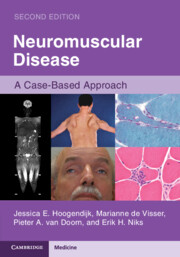Case 2 - Primary Lateral Sclerosis (PLS)
from Disorders of the Anterior Horn Cell
Published online by Cambridge University Press: 29 November 2024
Summary
At about the age of 40, the patient noticed difficulty playing tennis. He could no longer hop easily from one leg to the other. After a game, he experienced pain in both legs. At age 43, he stopped taking part in competition, and five years later had to give up playing altogether. At that time, he sometimes missed the brake and accelerator pedals of his car. Walking became increasingly difficult. Sometimes he almost fell due to weakness of his left leg, and he had to use a walking stick. From the age of 50 onwards he used a wheelchair for outdoor transportation. At 52, he could only work part-time as his dexterity decreased. Urinary continence was not an issue, but when he felt the urge, he had to rush to the toilet. His family history was not informative.
Keywords
Information
- Type
- Chapter
- Information
- Neuromuscular DiseaseA Case-Based Approach, pp. 77 - 78Publisher: Cambridge University PressPrint publication year: 2024
